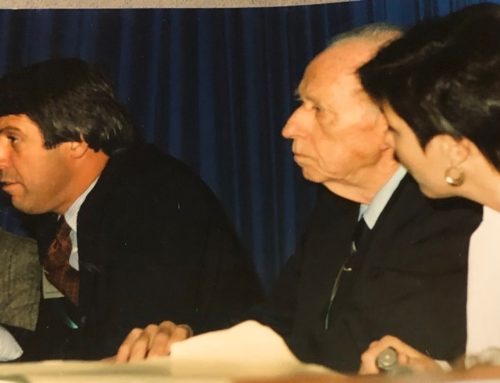 In his book, “Outliers,” Malcolm Gladwell speaks of many topics relevant to leadership, management, competence and family business. He argues, and with good reason, that it takes a minimum of 10,000 hours of focused effort to develop a skill, even more to be come skilled to the point where others call you “gifted” in that skill. Here are a few
In his book, “Outliers,” Malcolm Gladwell speaks of many topics relevant to leadership, management, competence and family business. He argues, and with good reason, that it takes a minimum of 10,000 hours of focused effort to develop a skill, even more to be come skilled to the point where others call you “gifted” in that skill. Here are a few
Daniel Barenboim is a world famous conductor, pianist and jazz musician. Whether at the keyboard or conducting from the podium, he is powerful and elegantly subtle, such that the music he produces communicates great passion and awareness. He didn’t start out at that level – it took years of effort to develop and refine his craft. To witness him in performance is an opportunity to observe true genius at work. What you witness and hear is the result of many multiples of Gladwell’s observation that 10,000 hours of preparation are a minimum requirement for true competence and mastery.
Currently at the Denver Art Museum, is an exhibition titled, “Becoming van Gogh.” I was privileged to be part of a tour conducted by Dr. Timothy Standring, the curator who organized the Denver show. This is an extraordinary exhibition that took more than seven years and 200,000 miles of travel to organize. There were high level negotiations between leading museums and some private collectors, swaps made and promises for future deals…all to get the “right” paintings for the show.
Dr. Standring had a vision of not showing the most famous works, Iris, Sunflowers, Bedrooms and the artist, sans one ear. Instead, he wanted to show how Vincent evolved over time, how he worked with incredible discipline to refine his craft. The exhibition includes a demonstration of how Vincent used a special mechanical device of the day to incorporate perspective into his work. There are paintings by other artists, contemporaries who influenced van Gogh. Beside their paintings are van Gogh paintings that reflect those artists’ influence.
Van Gogh’s struggled with illness and the artistic flourishing of his last two years may have warped the public’s perception of his learning curve. Of course, today we think van Gogh is a genius, but he placed a high value on craftsmanship. When he started, he had no talent for drawing. On viewing his early drawings, one sees they’re not well done, some might say they are horrible.
So how did he develop?
The answer: persistence. If he couldn’t master a particular technique, he practiced, tried it 50 more times when necessary. He was one of those rare artists who had the energy to work through his fear of failure.
The essence of the exhibition is this: We, the viewers, get to see how van Gogh became van Gogh! It is clear that it took him 10,000 hours – and then some – to develop his craft.
I must also mention my admiration for Dr. Standring. He had a vision of what the exhibition could be… and he achieved his vision. The obvious question might be, “Where did Standring get the idea for this totally unique approach to the study of van Gogh’s work?" He got it by putting in his 10,000+ hours of preparation to become a museum curator. He has studied art for 30+ years, a curator for perhaps 25 years. That probably adds up to 60,000 hours!! What did his 10,000 or 60,000 hours look like?
Dr. Standring has been at the Denver Art Museum since 1989 and has held a variety of positions including Deputy Director, Chief Curator and Curator of the Berger Collection. In addition to his most recent exhibition, “Inspiring Impressionism,” he has curated nine other extremely successful shows at the museum including “Sargent and Italy,” The Phillips Collection and European Masterpieces. Standring has also been awarded a number of prestigious academic fellowships such as Guest Scholar at the J. Paul Getty Museum, Senior Fellow at the Center for Advanced Studies in the Visual Arts at the National Gallery in Washington, D.C. and most recently was a Fellow at the Clark Art Institute.
Timothy Standring received his B.A. from the University of Notre Dame and his M.A. and Ph.D. from the University of Chicago. He has taught at Pomona College, Lawrence University, Loyola University of Chicago and has served as Director of the School of Art and Art History at the University of Denver, where he still holds a professorship.
Standring is not van Gogh but he gets van Gogh! It was his keen understanding of the evolution of van Gogh as an artist that shaped Standring’s thinking and guided him in conceptualizing, then mounting this exhibition. Clearly this man exceeds Gladwell’s requirements for competence as described in “Outliers.”
I am in my forty-fifth year of working as a consultant to family business. More than 30 years ago I began recommending that to enter a family business one must have worked elsewhere for 5 years, and in the final two years of that period, the individual must have earned a least one promotion. (If you haven’t had a promotion in two years, chances are you are not a great employee. If you are not a great employee for another company, then it is unlikely you will be a great employee in the family business.)
In a normal job, one works 2,000 hours in one year. In five years, one would have accumulated 10,000 hours on the job. Thirty years ago, when I first recommended the “Five Year Standard,” Gladwell was an undergraduate, yet to observe that 10,000 hours made the difference between mediocre and competent. I simply knew that one didn’t become fully competent without a great deal of effort. It is a coincidence that my recommendation of 5 years is equivalent of 10,000 hours.
Working in a family business can be very complex. Relationships can be complex. It is never easy to earn respect when you are the daughter or son of the boss. There are, however, three fundamentals you must master:
- Must understand the “technology” of your business.
- Must understand prudent financial principles for the business and for yourself, as an individual.
- Must understand and respect boundaries and have the necessary structures in the family and the business to reflect this understanding.
This all begins when children are very young, with the success of the child grounded in the quality of the parenting.
The Task of Parents:
To raise responsible adults, who have high self-esteem,
and can function independently in this world.
If parents have not been successful in execution of this task, then there is no amount of grooming of successors that will make up for poor work habits, arrogance or sense of entitlement. It is said, “If you are smart, you can pretend to be dumb, but if you are not very smart, you can’t fake it.”
Good work habits start at an early age, whether it is being responsible for toys, the condition of your room or completion of homework. These good work habits are carried over into adulthood. If, as a child you were allowed to let things “slide,” meaning you were never given responsibility for a task nor held accountable for an outcome, then you are at risk when you work anywhere and doubly so when you work in your family business.
Now, I ask you, the reader, to pause and reflect for a moment. Can competence be developed, learned and mastered in 10,000 hours? How long does it REALLY take to become competent, to earn the respect of others working in the business?
If you are the parent owning the business, reflect on your 10,000+ hours, then the preparation of the family member candidate for a position in your business. Does the candidate for the position have the patience and persistence and the discipline to qualify for the job? Do they have the passion of van Gogh, Barenboim or Standring to master their craft? These are the qualities that will make your family business rise above the average.
As best as I can ascertain, Calvin Coolidge didn’t say much of note, but consider this statement by the 30th President of the United States:
“Nothing in the world can take the place of persistence.
Talent will not; nothing is more common than unsuccessful men with talent.
Genius will not; unrewarded genius is almost a proverb.
Education will not; the world is full of educated derelicts.
Persistence and determination alone are omnipotent.”
Calvin was right!
I originally wrote this post for Family Business Wiki. Click here to visit the site. Family Business Wiki's "Town Square" helps those in family business to build business networks, ask questions and share knowledge.
Does Your Family Business Need Help?
Family Business Matters has extensive experience assisting family businesses. With many decades of experience, we understand the wide variety of challenges that families face as they work together to build, grow and sustain a thriving family business generation after generation. Through conferences, continuing education programs, family business retreats, speaking engagements and private family business consulting services, Family Business Matters has assisted more than 450 family-owned businesses around the world chart their way through family business issues of all shapes and sizes.
Contact Us
For more information on how Family Business Matters can help your family business survive and thrive, please contact us today at (970) 948-5077.







